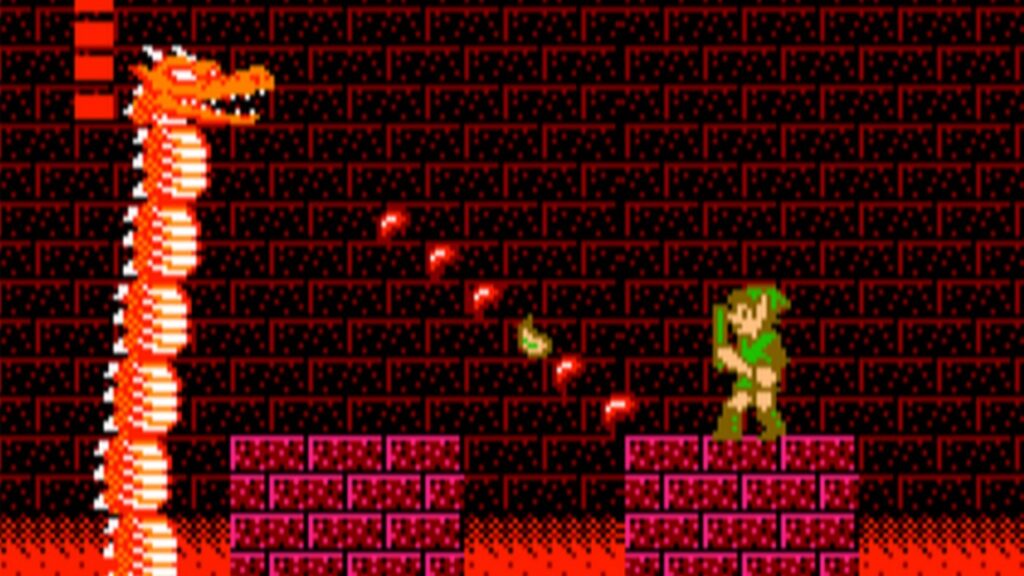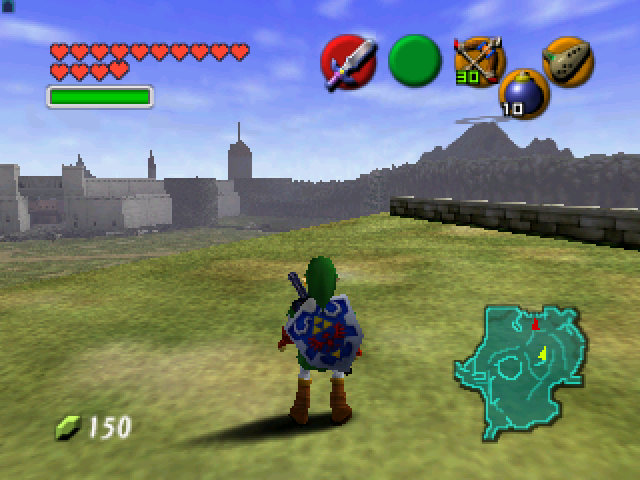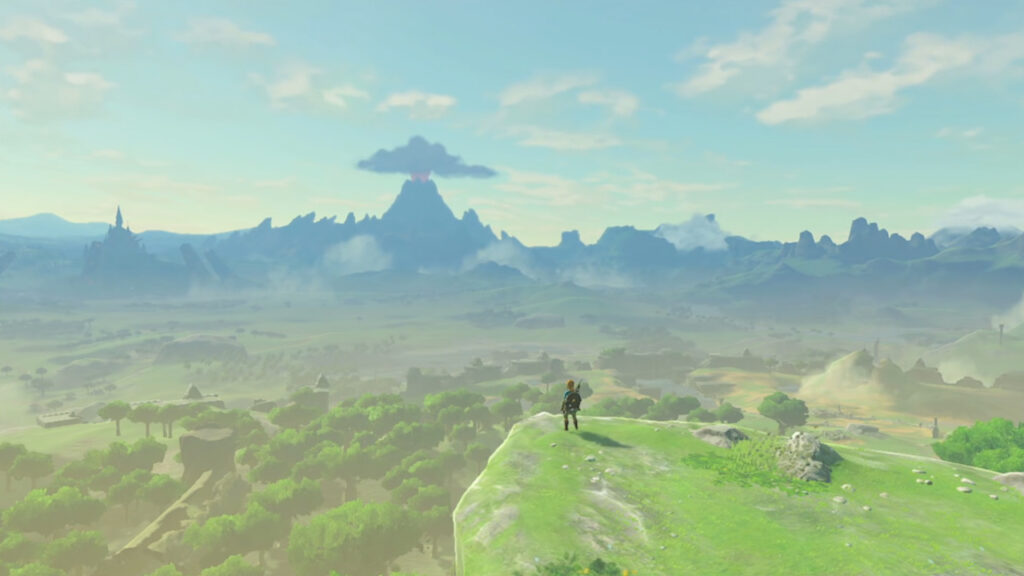I’m a big fan of The Legend of Zelda. My first MYOPIA was about Zelda. I’ve always seen the series as being the pinnacle of adventure games. With many titles in the series, I’ve naturally categorized my favorites. I’ve tried to approach ranking these games based on experiences when I first played them–usually playing in pretty near proximity to the release. Of course, this is by far-and-wide not the only ranking of Zelda games on the internet, but it is my own opinionated top ten, with a justification on why certain games have stood out as best among the best.

10: Zelda 2: The Adventure of Link
When I bought Zelda 2 in 1989, it was an era when Nintendo sequels were usually better than the originals. At least, Super Mario Bros. and Megaman both seemed to prove such a theory true. In Zelda 2’s case, the sequel had better graphics, and better action. I loved exploring new towns and castles. Still, the game was cryptic and challenging, with the Death Mountain maze having an almost insurmountable difficulty curve for some players. I honestly didn’t beat this game until I was nearly an adult. I’ll admit the game is a bit jarring in terms of the map to side-scrolling transitions. People today call it an oddball, but I really love it for its unique gameplay. Still, I do believe this sequel lacks what has come to epitomize the perfect Zelda experience, but more on that quality later.

9: Twilight Princess
This Gamecube/Wii hybrid entry was much anticipated in the wake of what many people saw as a disappointing direction for the series after many deemed the Wind Waker far too childish to even give a chance. Twilight Princess was a far darker direction for the series. It expanded upon the 3-D world that had been getting more advanced since the days of Nintendo 64. Twilight Princess has a deep story with some great action, however, I must say I wasn’t a fan of having to play through many areas as Wolf-Link. Sure, this was something different, but working with Midna often got tedious, and a slow start to the game definitely bogged down what eventually proved a really enticing story.
8: A Link Between Worlds

Around the three-dimensional days of Nintendo 64, and height of popularity with Gameboy Color, portable and 3D Zelda games branched into different paths. Portable Zelda games continued with traditional top-down perspectives, and often experimented with new concepts. A Link Between Worlds is an homage to the SNES’s A Link to the Past. This game offers some really exciting innovation for reimagining a classic, versus simply updating graphics and calling it, remake. A Link Between Worlds not only returns to the top-down perspective, it adds fun and challenging interaction to the two-dimensional world also.
7: Link’s Awakening

Considering the limitations on the original Gameboy, Link’s Awakening is immense in terms of setting and detail. The story is extremely charming and it was nice to have the fourth Zelda game feature a different antagonist than Ganon. In fact, the entire setting of Hyrule, the Triforce, and the namesake herself, do not play any integral parts in Link’s Awakening. The game’s different setting on Kolohint Island offers lots of new characters and enemies. I admittedly found the end of Link’s Awakening a little depressing. The entire adventure, and all the wondrous inhabitants of the island, are considered a dream. The legacy of this game is so well-liked that aspects originating here were rolled into later titles, and the spirit of Kolohint Island continues to be a part of the Zelda lineage.
6: Majora’s Mask

It’s weird. Well, that might be the best first impression one gets from Majora’s Mask. This game was a direct sequel to much beloved, Ocarina of Time, though it’s also very different. Majora’s Mask has a timer system that severely inhibits one’s ability to get lost in exploration. Still, there is also a sense of impending doom in the land of Termina. A seasoned, albeit boy-Link, is trying to prevent catastrophe. The game features a different antagonist than Ganon, which it’s probably growing clear I do like the games that feature different antagonists. Also revolutionary, Majora’s Mask allows players to experience Link becoming different Hyrulian beings. Despite that the game’s timer can cause some annoyance and anxiety, Majora’s Mask pays off with some really mind-blowing moments that are better experienced than explained.
5: The Legend of Zelda

Many games on the Nintendo Entertainment System could be explained by a single gameplay picture. Platformer, shooter, action, sports, in the early days of the NES, us kids naturally grouped games together. The first time I heard about The Legend of Zelda, it was described to me as being unlike any other game on the system. In fact, playing the first Zelda felt more like an experience than a simple game. The game manual came with the introduction to a story, and one in which the player was meant to become part of the adventure ahead. The Legend of Zelda offered choices on where to go and what to do. It offered a fair degree of freedom and that was one of the best parts about getting lost in the world. Getting lost often led to finding secrets, or stumbling upon something unexpected. The original game inspired a legacy, and I doubt I need to say anymore than that.
4: Ocarina of Time

When I first heard a three-dimensional Zelda game was in development, I waited, and waited, waited a little more…this was the first time I got to experience release-date-delays. Eventually, Ocarina of Time proved worth the wait. The three-dimensional setting painted Hyrule in more detail than I’d ever imagined. The huge world, interesting characters, mysterious secrets, it all allowed one to spend many hours exploring. The story was great too, and the game came out at a time when plot secrets could be a little more obscured. I had no idea who Shiek really was, for example. The game gave immense depth to main characters like Zelda and Ganondorf, who is admittedly much creepier in human-form than the pig-like creature of Ganon. The fighting, the dungeons, the dialogue, it all evolved in the right directions. The game might easily be argued as the best on the Nintendo 64, and though it seemed quite perfect at the time, a few Zelda games surprisingly manage to outdo it.
3: A Link to the Past

The first two Zelda games were amazing, and with the Super Nintendo, series-creator, Shigeru Myamoto, returned the gameplay to a top-down perspective. A Link to the Past had ideal graphics, fantastic music, a more in-depth story, a great world to explore, and for those of us playing in the early 90s, tons of surprises. Even the dark-world came as a total shock to me on my first playthrough. Well, it’s pretty much called the perfect top-down Zelda game, and that’s an assessment which would be hard to argue with. I’ll also add that I’ve found it to have lasting appeal in terms of replay. I’ve beaten it many times over the years and could likely easily get sucked back into the experience of playing it again. Well, it’s lucky that such an early Zelda game established the “gold-standard” of what the Zelda adventures should feel like.

2: The Wind Waker
For many years, I called Wind Waker my favorite Zelda game, and I doubted the game could ever be topped. My favorite aspect of Zelda games is to essentially feel “linked” into the adventure, into the idea of exploring, getting lost, of encountering the unexpected and feeling swept away in the world within the game. The Wind Waker’s setting is a flooded Hyrule, one where Link has to take to a boat and sail the open seas to eventually save the world. Although the storyline and gameplay are great, what I remember most about Wind Waker, is sailing over waves, finding talking fish, outrunning enemy ships or sea monsters. I also love many of the twists in the storyline. For example, the young hero in this game first sets out to save his little sister, long before words like Zelda, Tri-force, or master-sword are ever muttered. For anyone who hasn’t ever played it, don’t let the cartoonish graphics fool you; this game has plenty of depth. I just don’t want spoil any of the surprises before this game gets a chance to work it’s charisma on a new player.
1: Breath of the Wild
I’m not necessarily someone who thinks new is always better. In this case though, the latest Zelda game can be called nothing short of perfect. Breath of the Wild’s Hyrule is bleak. When Link wakes from a long-slumber, the player is faced with an immense world where finding one’s direction and exploring is almost completely up to the player. There is a sparse, yet still deep back-story, as well as a structure of progression that leads one through the game. What Breath of the Wild does so well, is give freedom on how to approach the adventure. Truth be told, I had seen pure freedom in the first The Legend of Zelda. What I have always liked best about all Zelda games is exploring the over-world. Many games on this list had moments that made me say, “wow.” In Breath of the Wild, that wow-moment came early, came after I jumped off the Great Plateau and traversed through fog to first see and realize just how immense the adventure ahead was going to be. I recall some people complained that the game wasn’t like traditional Zelda in that it didn’t have immense dungeons, it didn’t give the player enough items, or follow a traditional story, but I’d certainly argue that’s why it’s so great. Breath of the Wild is innovative, and I hope it has set the new standard for all future Zelda games.
